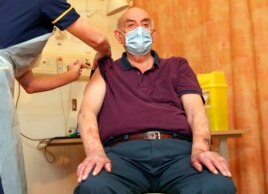04 January 2021
The United States says it is considering giving some people half the dose of Moderna's COVID-19 vaccine in order to vaccinate more people.
Moncef Slaoui is the head the country's vaccine program. He said Sunday that officials were discussing the possible plan with Moderna and the Food and Drug Administration (FDA). Moderna's vaccine requires two doses per individual.
He said that giving half of the dose to people between the ages of 18 and 55 will allow the vaccination program to "double the number of people with the doses we have."
He added that just one injection causes an "identical" immunity.
Moderna and the FDA could not immediately be reached for comment.
The U.S. Centers for Disease Control and Prevention said it had injected more than four million people with a first dose of vaccine by Monday morning. It said it had sent out more than 13 million doses.
The U.S. has also approved a two-dose vaccination treatment from drug company Pfizer.
The government's vaccination plan has not been meeting its goals. Officials had hoped to have 20 million people vaccinated by the end of the 2020.
Vaccine race
Britain has administered about one million vaccinations since it approved the Pfizer vaccine in early December. On Monday, it became the first country to use a vaccine developed by Oxford University and AstraZeneca. That vaccine is easier to store and transport.
A new surge of COVID-19 cases is threatening the country's National Health Service. Britain is trying to vaccinate older people and others at higher risk from the disease. Prime Minister Boris Johnson's government has secured 100 million doses of the Oxford/AstraZeneca vaccine.
Eighty-two-year-old Brian Pinker was the first person to get that vaccine outside of experimental use.
Pinker, who has kidney disease, said he was "proud" the medicine was invented in Oxford.

82-year-old Brian Pinker receives the Oxford University-AstraZeneca COVID-19 vaccine from nurse Sam Foster at the Churchill Hospital in Oxford, southwest England on January 4, 2021.
Israel is the world's vaccination leader. More than ten percent of its population is already vaccinated. Israel is now injecting more than 150,000 people a day.
In December 2020, China approved its first COVID-19 vaccine. It is one injection and was created by drugmaker Sinopharm. The government-owned company has said its treatment is 79 percent effective against the virus.
Russia has been providing its COVID-19 vaccine, called Sputnik V, since August. More than 100,000 people have been injected. In November, the government said the treatment was more than 91 percent effective.
New versions
Britain has seen a surge in coronavirus cases in recent weeks as officials struggle to control the spread of a new version of the COVID-19 virus. The new version is far more contagious than others. Officials have recorded more than 50,000 new infections a day since December 29. On Monday, they reported 407 deaths related to the virus. That brings the total number of confirmed COVID deaths in Britain to 75,431.
Britain also reports the presence of a second new version of coronavirus. It appears that version came from South Africa.
Johnson said on Sunday that more restrictions were likely, even with millions already living under the highest level of restrictions.
Starting at midnight tonight, most of mainland Scotland will be in total lockdown, announced Scottish First Minister Nicola Sturgeon.
Europe
In Germany, government spokesman Steffen Seibert said Monday that the government does not regret its decision last year to have the European Union order vaccines for all 27 nations. He said that for a country in the middle of Europe with many borders, "everyone for themselves cannot be the way."
Nearly 265,000 vaccinations have been reported since the program began one week ago. Critics are pointing to faster programs in the U.K., the U.S. and Israel.
Health Ministry spokesman Hanno Kautz said 1.3 million doses of the BioNTech-Pfizer vaccine were delivered to Germany before the end of 2020 and another 670,000 are due on Friday. Germany has 83 million people.
I'm Susan Shand.
The Associated Press and the Reuters News Agency reported this story. Susan Shand adapted it for Learning English. Caty Weaver was the editor.
_______________________________________________________________
Words in This Story
dose – n. the amount of a medicine, drug, or vitamin that is taken at one time
immunity – n. the power to keep yourself from being affected by a disease
surge - n. a move that is very quick and sudden in a particular direction
contagious – adj. able to be passed from one person or animal to another by touching